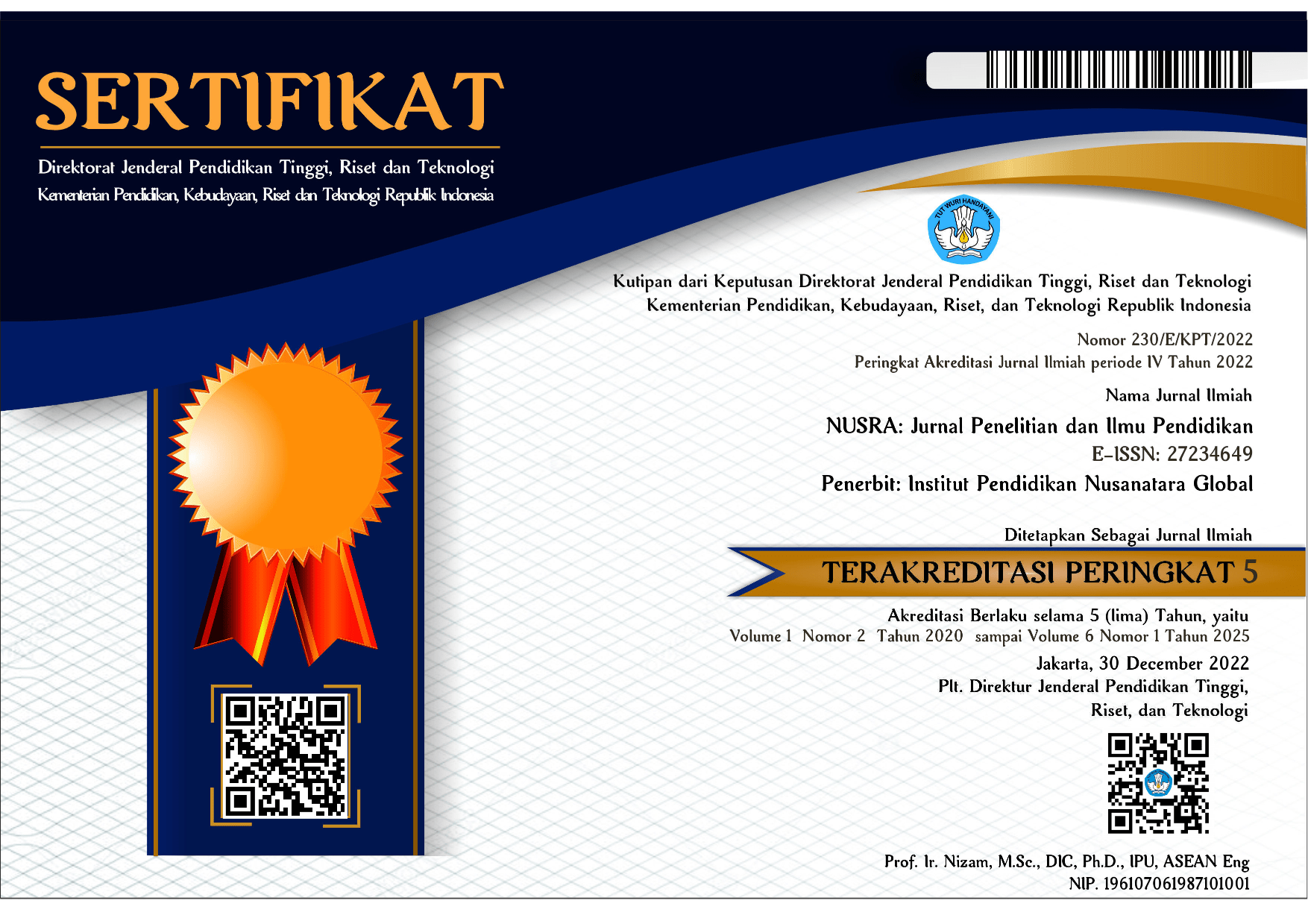Efektivitas Penggunaan Artificial Intellegence dalam Meningkatkan Proses Pembelajaran pada Siswa (Studi Kasus Ma Unggulan Al-Imdad)
DOI:
https://doi.org/10.55681/nusra.v5i3.3182Keywords:
Artificial, Intelligence, LearningAbstract
This article aims to look at the effectiveness of using Artificial Intelligence (AI) in student learning with a case study of MA Unggulan Al Imdad. The digital era has rapidly changed the way education is perceived, which impacts the role and duties of teachers. Teachers are faced with new challenges, such as managing abundant information, adapting learning styles to each student's needs, and providing effective feedback on student progress. This study used an experimental method with a one-group pretest-posttest design. The research subjects were Class X students. The research subjects totaled 30 people consisting of class X specialization of science and social studies. The results of this study showed a significant increase in the average student learning score by 14.45%, with a significance value of 0.003 (p < 0.05). Thus, the conclusion of this study includes three findings. First, the use of AI assists teachers in managing data and information by using sophisticated algorithms to analyse and interpret student data. Second, AI technology can support the personalisation of learning. Third, AI can be used to provide effective feedback to students. Therefore, the use of AI can significantly improve student learning.
Downloads
References
Aggarwal, K. K. and Agrawal, S. (2024) ‘Artificial intelligence and its role in financial market’, Global Financial Analytics and Business Forecasting, pp. 67–82.
Alamri, H. et al. (2020) ‘Using personalized learning as an instructional approach to motivate learners in online higher education: Learner self-determination and intrinsic motivation’, Journal of Research on Technology in Education, 52(3), pp. 322–352. doi: 10.1080/15391523.2020.1728449.
Apriani, R. et al. (2020) ‘The Effectiveness of Using Google Classroom to Measure the Level of Understanding Student Materials’, Proceedings - 2020 6th International Conference on Education and Technology, ICET 2020, (1), pp. 200–204. doi: 10.1109/ICET51153.2020.9276608.
Bates, T. et al. (2020) ‘Can artificial intelligence transform higher education? The aim of this edition’, International Journal of Educational Technology in Higher Education, 17, p. 42. Available at: http://creativecommons.org/licenses/by/4.0/.
Demir, A. et al. (2020) ‘The role of E-service quality in shaping online meeting platforms: a case study from higher education sector’, Journal of Applied Research in Higher Education, 13(5), pp. 1436–1463. doi: 10.1108/JARHE-08-2020-0253.
Fichten, Catherine et al. (2022) ‘AI-Based and Mobile Apps: Eight Studies Based on Post-Secondary Students’ Experiences’, Journal on Technology and Persons with Disabilities Santiago, J, 10, pp. 97–114. Available at: https://scholarworks.csun.edu/handle/10211.3/223460.
Fitria, T. N. (2021) ‘Artificial Intelligence (AI) in Education: Using AI Tools for Teaching and Learning Process’, Proceeding Seminar Nasional & Call for Papers, pp. 134–147.
González-Calatayud, V., Prendes-Espinosa, P. and Roig-Vila, R. (2021) ‘Artificial intelligence for student assessment: A systematic review’, Applied Sciences (Switzerland), 11(12). doi: 10.3390/app11125467.
Holstein, K., McLaren, B. M. and Aleven, V. (2019) Designing for complementarity: Teacher and student needs for orchestration support in AI-enhanced classrooms, Lecture Notes in Computer Science (including subseries Lecture Notes in Artificial Intelligence and Lecture Notes in Bioinformatics). Springer International Publishing. doi: 10.1007/978-3-030-23204-7_14.
Hsieh, Y. Z. et al. (2020) ‘ARCS-assisted teaching robots based on anticipatory computing and emotional Big Data for improving sustainable learning efficiency and motivation’, Sustainability (Switzerland), 12(14). doi: 10.3390/su12145605.
Khoiriah, S. U., Lubis, L. K. L. U. and Anas, D. K. N. (2023) ‘Analisis Perkembangan Sistem Manajemen Pendidikandi Era Society 5.0’, JISPENDIORA: Jurnal Ilmu Sosial, Pendidikan Dan Humaniora, 2(2), pp. 117–132. Available at: https://doi.org/10.56910/jispendiora.v2i2.650.
Kuleto, V. et al. (2021) ‘Exploring opportunities and challenges of artificial intelligence and machine learning in higher education institutions’, Sustainability (Switzerland), 13(18), pp. 1–16. doi: 10.3390/su131810424.
Lin, X. F. et al. (2022) ‘Teachers’ Perceptions of Teaching Sustainable Artificial Intelligence: A Design Frame Perspective’, Sustainability (Switzerland), 14(13). doi: 10.3390/su14137811.
Liu, Y., Chen, L. and Yao, Z. (2022) ‘The application of artificial intelligence assistant to deep learning in teachers’ teaching and students’ learning processes’, Frontiers in Psychology, 13. doi: 10.3389/fpsyg.2022.929175.
Liu, Y., Saleh, S. and Huang, J. (2021) ‘Artificial Intelligence in Promoting Teaching and Learning Transformation in Schools’, International Journal of Innovation, Creativity and Change, 15(3), pp. 891–902. doi: 10.53333/ijicc2013/15369.
Luan, H. et al. (2020) ‘Challenges and Future Directions of Big Data and Artificial Intelligence in Education’, Frontiers in Psychology, 11(October), pp. 1–11. doi: 10.3389/fpsyg.2020.580820.
Nicol, D. (2021) ‘The power of internal feedback: exploiting natural comparison processes’, Assessment and Evaluation in Higher Education, 46(5), pp. 756–778. doi: 10.1080/02602938.2020.1823314.
Oller, J., Engel, A. and Rochera, M. J. (2021) ‘Personalizing learning through connecting students’ learning experiences: an exploratory study’, Journal of Educational Research, 114(4), pp. 404–417. doi: 10.1080/00220671.2021.1960255.
Pondel, M. (2019) Mieczysław Lech Owoc Artificial Intelligence for Knowledge Management.
Rahmatullah, A. S. et al. (2022) ‘Digital era 4.0’, Linguistics and Culture Review, 6, pp. 89–107. doi: 10.21744/lingcure.v6ns3.2064.
Tatineni, S. (2020) ‘Recommendation Systems for Personalized Learning: A Data-Driven Approach in Education’, Journal of Computer Engineering and Technology (JCET), 4(2), pp. 18–31.
Wu, S. Y. and Yang, K. K. (2022) ‘The Effectiveness of Teacher Support for Students’ Learning of Artificial Intelligence Popular Science Activities’, Frontiers in Psychology, 13(June). doi: 10.3389/fpsyg.2022.868623.
Yang, F. and Li, F. W. B. (2018) ‘Study on student performance estimation, student progress analysis, and student potential prediction based on data mining’, Computers and Education, 123(October 2017), pp. 97–108. doi: 10.1016/j.compedu.2018.04.006.
Downloads
Published
How to Cite
Issue
Section
License
Copyright (c) 2024 Nenden Susilowati, Sulasmi

This work is licensed under a Creative Commons Attribution-ShareAlike 4.0 International License.














